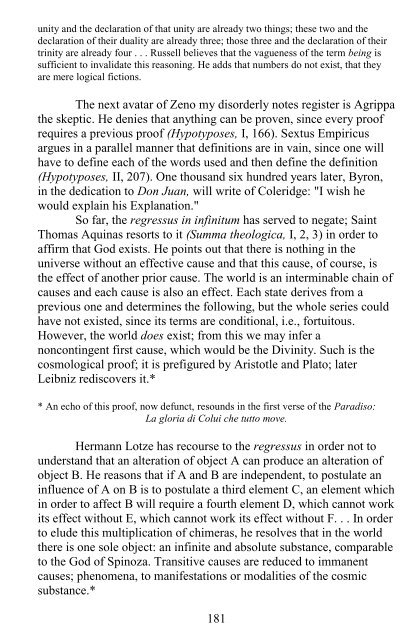Jorge Luis Borges - Labyrinths
Jorge Luis Borges - Labyrinths
Jorge Luis Borges - Labyrinths
You also want an ePaper? Increase the reach of your titles
YUMPU automatically turns print PDFs into web optimized ePapers that Google loves.
unity and the declaration of that unity are already two things; these two and the<br />
declaration of their duality are already three; those three and the declaration of their<br />
trinity are already four . . . Russell believes that the vagueness of the term being is<br />
sufficient to invalidate this reasoning. He adds that numbers do not exist, that they<br />
are mere logical fictions.<br />
The next avatar of Zeno my disorderly notes register is Agrippa<br />
the skeptic. He denies that anything can be proven, since every proof<br />
requires a previous proof (Hypotyposes, I, 166). Sextus Empiricus<br />
argues in a parallel manner that definitions are in vain, since one will<br />
have to define each of the words used and then define the definition<br />
(Hypotyposes, II, 207). One thousand six hundred years later, Byron,<br />
in the dedication to Don Juan, will write of Coleridge: "I wish he<br />
would explain his Explanation."<br />
So far, the regressus in infinitum has served to negate; Saint<br />
Thomas Aquinas resorts to it (Summa theologica, I, 2, 3) in order to<br />
affirm that God exists. He points out that there is nothing in the<br />
universe without an effective cause and that this cause, of course, is<br />
the effect of another prior cause. The world is an interminable chain of<br />
causes and each cause is also an effect. Each state derives from a<br />
previous one and determines the following, but the whole series could<br />
have not existed, since its terms are conditional, i.e., fortuitous.<br />
However, the world does exist; from this we may infer a<br />
noncontingent first cause, which would be the Divinity. Such is the<br />
cosmological proof; it is prefigured by Aristotle and Plato; later<br />
Leibniz rediscovers it.*<br />
* An echo of this proof, now defunct, resounds in the first verse of the Paradiso:<br />
La gloria di Colui che tutto move.<br />
Hermann Lotze has recourse to the regressus in order not to<br />
understand that an alteration of object A can produce an alteration of<br />
object B. He reasons that if A and B are independent, to postulate an<br />
influence of A on B is to postulate a third element C, an element which<br />
in order to affect B will require a fourth element D, which cannot work<br />
its effect without E, which cannot work its effect without F. . . In order<br />
to elude this multiplication of chimeras, he resolves that in the world<br />
there is one sole object: an infinite and absolute substance, comparable<br />
to the God of Spinoza. Transitive causes are reduced to immanent<br />
causes; phenomena, to manifestations or modalities of the cosmic<br />
substance.*<br />
181


